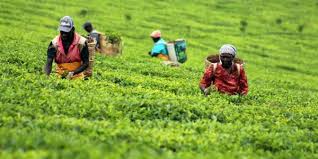Kenya Tea Development Agency(KTDA) managed factories have earned a total of 69.77 billion shillings ($665 million) from tea sales for the year ended June 2019.
The current performance is 18 percent below last year’s performance when the factories earned 85.74 billion shillings ($819 million).
A similar situation of high surplus was last experienced in the year 2013/14 when the total earnings were 52.97 billion shillings($501million).
This performance has been realized at a time when most of tea producing countries have registered increased production while importing markets have experienced political and economic challenges.
Global tea production stands at 5.8 billion kilos while demand is at 5.6 billion kilos resulting in a 200 million kilos surplus.
During the year, the factories processed 1.13 billion kilos of green leaf into 262 million kgs of made black tea which was sold at an average price of US$ 2.59 compared to US$3.14 realized the previous year, representing an 18 percent drop.
Pakistan, Egypt, UK and UAE and Sudan remain Kenya’s key export destinations for the black CTC tea type processed in Kenya.
These countries have had significant currency devaluation due to political/economic challenges with Sudan, Pakistan and Egypt and UK registering 70 percent, 50 percent, 20 and 20 percent respectively.
Tea being a commodity traded in US Dollars, the currency devaluation reduces the purchasing power of the consuming population.
Resumption of economic sanctions by the United States of America on Iran cut off a substantial market for Kenya’s tea production.
KTDA-managed factories are facing challenges such as high costs of energy and labour.
The factories are also grappling with other challenges like tea hawking that has led to a reduction in the amount of green leaf available to some factories, thereby adversely affecting their operating capacity, and quality of leaf available for processing.
A number of factories have also ventured into orthodox tea manufacture in a move to reduce reliance on Black crush tear curl (CTC) tea. The strategy is aimed at diversifying markets for tea farmers.
The main markets for orthodox teas are Russia, Germany, USA, Dubai, Taiwan, Turkey, Iran, The Czech Republic, Kazakhstan and Canada.
JK/abj/APA


